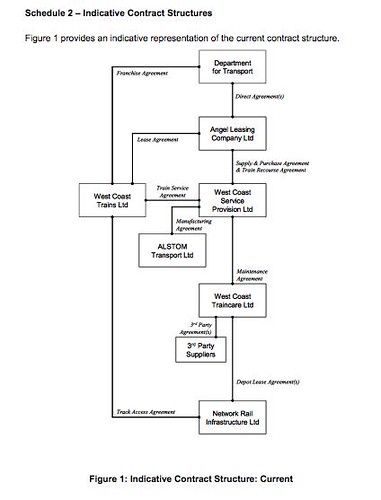Read an article just now News Story
That suggests Northeast Corridor be opened to private competition.
Any comments, John
That suggests Northeast Corridor be opened to private competition.
Any comments, John

As I recall the Brits privatized rail travel (they still use the national rail network though). From what I've read, they are not all that happy with it. I think it would have some positives and minuses.Read an article just now News StoryThat suggests Northeast Corridor be opened to private competition.
Any comments, John
Originally we privatized the network too, then it got brought back into government's hands (tho with the current government that's a dubious 'advantage'). IMHO the whole thing was done for political reasons anyway.As I recall the Brits privatized rail travel (they still use the national rail network though). From what I've read, they are not all that happy with it. I think it would have some positives and minuses.Read an article just now News StoryThat suggests Northeast Corridor be opened to private competition.
Any comments, John
I thought that too, so why even have a bill like this?The details are scarce, but if a private company has to come in with their own equipment and pay to upkeep the rails, they will never do it. There is no money in moving people.
Because they sound good to average joe's, thereby winning favor to politicians?I thought that too, so why even have a bill like this?The details are scarce, but if a private company has to come in with their own equipment and pay to upkeep the rails, they will never do it. There is no money in moving people.
And because IMHO, John Mica wants Amtrak dead. He tried attacking it head on and lost, so now he's trying to come up with creative and attractive looking proposals that will only lead to Amtrak's demise in the long run. They sound good on paper at first read, but it one looks deeply into things and analyzes things, they are designed to kill Amtrak long term.Because they sound good to average joe's, thereby winning favor to politicians?I thought that too, so why even have a bill like this?The details are scarce, but if a private company has to come in with their own equipment and pay to upkeep the rails, they will never do it. There is no money in moving people.
I'm not so sure...I believe that the year to year funding process has been part of the problem, as Amtrak has never been able to really know what was coming the next year. A multi-year funding cycle would improve things a lot, allowing Amtrak to see over the horizon for planning and funding projects. That is something this bill will do....No private entities came forward in 1970-71 and I doubt there would be any now. Amtrak needs a consistant year to year funding source that will allow it to build a passenger rail infrastructure that will succeed.
Texas also has a huge income from taxes on the oil and gas industry. Much of Texas is fairly easy territory and climate for road building and maintenance. Distances are fairly long between cities, so there is a lot of long distance driving generating gas tax money on low cost to maintain rural highways. Urban road construction is so expensive that it is heavily subsidized by rural driving. An urban freeway would not pay for itself with the gas tax generated if the traffic was bumper to bumper two layers high 24/7. That is why rural residents should support urban rail transit with greater enthusiasm than anyone in the cities themselves.I get into debates in a local forum here in the DFW area about DART. A couple guys argue how DART is a huge boondoggle and how the highways in Texas are fully paid for by the gas tax and other registrations. In fact a surplus of that goes toward education because there is so much extra. I will admit, Texas does have a very well built road system.
<_<*clears throat*
Democracy is premised on the concept that more than half of the people are more than half right more than half of the time.
The concept is so flawed, I couldn't even know where to begin. If they want to sub-contract Amtrak out, they are rejecting the very concept that it was based on!

The freight railroads did no longer want passenger trains and did not want to maintain passenger fleets.I think Amtrak should have been created as a management company for the passenger end of the freight railroads rather than a railroad itself. It could have worked on the premises of setting routes and performance goals for the freight railroads and giving them subsidies based on how they do with these goals. Amtrak should still be the one selling the tickets but sell them at the freight railroads price. For example, Amtrak sell you a ticket on the "Norfolk Southern Crescent" and a ticket on the "CSX Silver Star" to get from NOL to MIA. It seems like something along these lines would have worked better than dumping old rundown equipment on Amtrak and expecting them to do the impossible (make a profit).
Odd that we rarely hear nostalgic pining (at least that I have noticed on this side of the pond) for the days long ago before most European railroads were nationalized, which I suppose I equate to our own pre-merger era. American railfans still look at their favorite fallen flag railroads in the same light that most people consider their favorite sports teams.The freight railroads did no longer want passenger trains and did not want to maintain passenger fleets.
In Europe several countries went from government run railroads and privatized, ask any citizen in Europe how well that (not) went.
Most people would love to see Europe go back to the Government railroads.
Enter your email address to join: